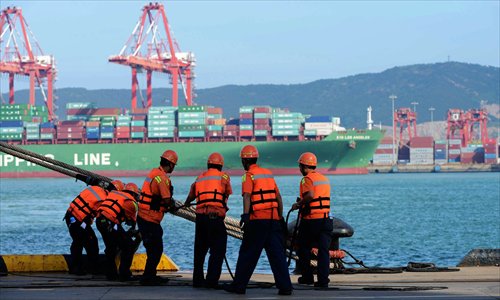
Workers pull a cable at the Qingdao Port in East China's Shandong Province. Photo: IC
China will contribute $40 billion to establish a Silk Road Fund and push forward preparation work for a newly launched infrastructure investment bank to strengthen connectivity in the Asia-Pacific region, Chinese President Xi Jinping said Sunday.
The fund will provide financing to countries and regions along the Silk Road economic belt and the 21st Century Maritime Silk Road (also known as the Belt and Road) for infrastructure construction, resources development and industrial cooperation, Xi said in a speech delivered at the 2014 Asia-Pacific Economic Cooperation (APEC) CEO Summit held in Beijing.
"China is willing to provide more public goods to the Asia-Pacific and the world with the rising of its overall national strength," Xi said.
The fund will be open and welcome investors from both within and outside of Asia, according to Xi.
The announcement of the fund comes just a few days after the launch of a bank with similar functions.
On October 24, 21 Asian countries signed the memorandum of understanding (MOU) on establishing the Asian Infrastructure Investment Bank (AIIB) as founding members.
The Beijing-headquartered AIIB, with the authorized capital of $100 billion, aims to start operation by the end of 2015, according to the MOU. China will work with other parties to push forward the operation of the AIIB as early as possible, Xi said Sunday.
China's initiatives on strengthening connectivity have been welcomed by its neighbors.
The proposals on the Belt and Road will increase trust, deepen economic cooperation, and strengthen cultural interaction among countries along the Belt and Road, read a communiqué released jointly by China and seven neighboring countries including Mongolia, Myanmar and Pakistan on Saturday.
The fund will provide financial support for Asian countries that aim to enhance connectivity, it said.
"Sitting on a large foreign currency reserve, China has the capability and should shoulder more responsibility for the region's common development," Zhang Baotong, a research fellow with the Shaanxi Provincial Academy of Social Sciences, told the Global Times Sunday. Northwest China's Shaanxi Province was the starting point of the ancient Silk Road.
Details such as how the fund will work or when the fund will start operation have not been announced.
Zhang thought the fund will likely operate as an industry fund, and its priority is facilitating transportation, such as investing in projects of railways and highways that connect China and Central Asian countries.
The establishment of the fund is also in accordance with China's western development strategy, and will benefit China's less-developed western areas, he noted.
Experts said the fund and the bank that China has initiated, will not conflict with, and furthermore, serve as a complementary element to existing financing mechanisms such as the Asian Development Bank (ADB) and the World Bank (WB).
"The funds provided by the ADB and WB could not satisfy the huge demand for infrastructure construction in Asia," said Chen Fengying, a researcher with the China Institutes of Contemporary International Relations.
According to estimation from the ADB in 2010, a total of $8 trillion will be needed to fund infrastructure construction across Asia between 2010 and 2020.
Both the Silk Road Fund and the AIIB will play an important role in financing infrastructure, but their focus and operation modes will be different, Chen told the Global Times.
The AIIB will focus on a wider range of Asian countries and projects, and will be more profit-driven as it encourages a public-private partnership, while the use of the fund will be more targeted, Chen said on Sunday.
